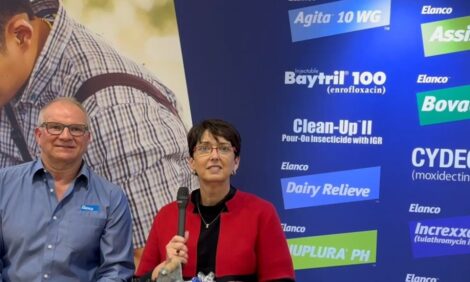



Ractopamine to Start New Battle in WTO?
ANALYSIS - The European Union, US and Brazil could be heading for another bitter war in the World Trade Organisation over the use of ractopamine as a growth promoter for beef cattle and pigs, writes Chris Harris.Last week Codex Alimentarius set maximum levels for the use of the drug at which the commission says the meat will be safe for human consumption.
In all about 27 countries around the world, including the US, Brazil, Canada, Mexico, Japan and South Korea had declared that meat from animals raised using ractopamine is safe.
However, about 100 other countries including the EU and China have banned its use.
When used as a feed additive, ractopamine is distributed through the blood to the muscle tissue.
In the muscle it binds to beta receptors and starts a chain of events that increase protein synthesis, increasing muscle fibre size. The drug is known to improve feed efficiency and increase carcase leanness and weight.
Scientific tests have been carried out to show that it is absorbed, distributed and then eliminated quickly.
The maximum residue levels that have been set by Codex will allow 10 parts per billion in both beef and pork.
However, these levels were set and approved by a majority of just two - 69 votes to 67 - after five years of negotiation.
The decision has been welcomed by the industry in the US and the US government.
AMI Vice President of International Trade William Westman, said: "The adoption of ractopamine MRLs should facilitate trade.
"International standards on food safety are essential for importing and exporting countries. These science-based standards are vital to protect consumer health and harmonize trade standards in all countries."
Tom Vilsack the US Agriculture Secretary said: "Currently, American producers face trade restrictions due to unjustified bans on the use of ractopamine, which has been approved by the U.S. Food and Drug Administration and used safely in the United States for 12 years as well as 25 other countries. These standards provide clear guidance to countries about safe use of ractopamine, which promotes lean meat production."
The head of the Division of Control of Additives at the Department of Agriculture in Brazil, Suzana Bresslau, said: "The whole supply chain will benefit because they already use this technology and now we have our parameter as an international benchmark. It was an important achievement and the Ministry of Agriculture participated actively so that these standards were adopted."
On the other hand, the European Union has reaffirmed its position that an international standard for ractopamine is not justified.
The European Food Safety Authority, which advises the European Union, has concluded that there is insufficient data on which to make a proposal for maximum residue levels for ractopamine and it has said that risks to human health cannot be ruled out.
EFSA's stance is that: "EFSA's FEEDAP Panel found weaknesses in the data underlying the JECFA assessment which would undermine any proposal for a maximum residue level for ractopamine. The Panel found that the study on cardiovascular effects in humans cannot be taken as a basis to derive an Acceptable Daily Intake (ADI) of 0-1 micrograms per kilogramme of body weight per day as proposed by JECFA. EFSA consulted the Community Reference Laboratory responsible for beta-agonists and the European Medicines Agency (EMEA) and included the results of this process in its final opinion. Notably, the Committee for Medicinal Products for Veterinary Use of the EMEA fully supported the safety evaluation of ractopamine made by the FEEDAP Panel."
Because of these safety concerns, the European Union's current legislation is going to remain in place.
The EU and the US and Canada have stood toe to toe over issues of the use of hormones in the production of beef and the trade restrictions that followed.
The argument over the use of hormones led to retaliatory sanctions on numerous products from the EU in export markets, but over the last year the arguments had appeared to cool and more compromise was on the table allowing greater quotas of non-hormone treated beef onto the European market.
Now, a similarly trenchant stance appears to be emerging over the use of ractopamine, and the World Trade Organisation can be expected to be the battleground for the two sides to fight out this issue, with the sanctions and bitter retaliation the ultimate consequence.



